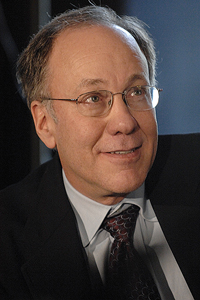National Academy of Science elects Myerson to its membership
By William Harmsw-harms@uchicago.edu
News Office
 Roger Myerson |
|
Roger Myerson, the Glen A. Lloyd Distinguished Service Professor in Economics, has been elected to the National Academy of Sciences.
He is one of 72 new members and 18 foreign associates from 15 countries who have been recognized for their distinguished and continuing achievements in original research.
Myerson has made seminal contributions to the fields of economics and political science. In game theory, he introduced a refinement of Nash’s equilibrium concept, called proper equilibrium. In the economics of information, his contributions include the revelation principle and the revenue-equivalence theorem of auction theory. He also has applied game-theoretic tools to political science to analyze and compare different electoral systems and constitutional structures.
Myerson was awarded the 2007 Nobel Memorial Prize in Economic Sciences for his contributions to mechanism-design theory, which was initiated by co-winner Leonid Hurwicz of the University of Minnesota. Myerson further developed it with others, including co-winner Eric Maskin of the Institute for Advanced Study.
This work has helped economists to understand how social plans for allocating resources may be constrained by the need to provide incentives for people to share information and to exert hidden efforts.
The National Academy of Sciences was established in 1863 by a congressional act of incorporation, which calls on the academy to advise the federal government, upon request, in any matter of science or technology.
![[Chronicle]](/images/sidebar_header_oct06.gif)